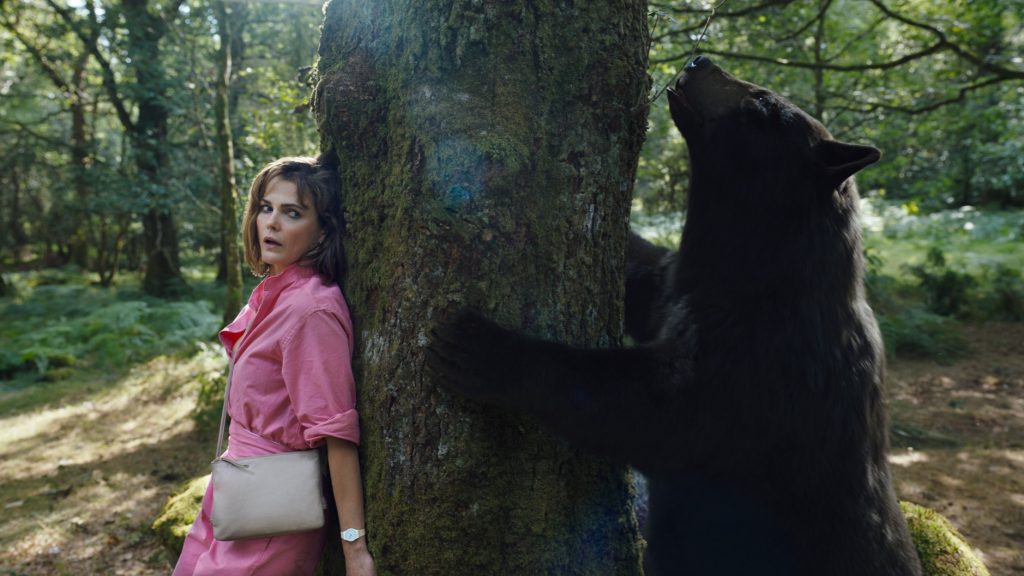Reviews include 40 Acres, Jurassic World: Rebirth, and Sorry, Baby.
TFCA Friday: Week of Feb. 24
February 24, 2023

Welcome to TFCA Friday, a weekly round-up of film reviews and articles by TFCA members.
In Release this Week!
Cocaine Bear (dir. Elizabeth Banks)
“The graphic violence is done in good fun and despite its grossness, one is always clear that it is all made up and in the movies and should be taken tongue-in-cheek,” advises Gilbert Seah at Afro Toronto.
“Trailers for Cocaine Bear suggest 95 minutes of non-stop clawing, biting, disemboweling and snorting, but fortunately there’s more going on here than just a bear killing people while out of its tree. Not a whole lot more, but enough that Cocaine Bear passes muster as a piece of comedic art and not just a fictional snuff film,” writes Chris Knight at the National Post. “It’s gruesome, funny stuff. I cringed more than once at the violence, but found myself laughing at the movie’s quieter funny moments.”
Emily (dir. Frances O’Connor)
“O’Connor comes closest to the mystery that is Emily Bronte in an extraordinary scene where the sisters use a family heirloom, a mask, to play an after-dinner game where you can impersonate anyone from Cleopatra to Queen Elizabeth,” notes Marc Glassman at Classical FM. “Emily puts on the mask, and in a vivid portrayal, becomes their dead mother, terrifying everyone in the room. Charlotte speaks of her as the “strange one” and that’s Emily, unknowable and beautiful.”
“Emily is well worth the while to watch, never mind that it all sounds like a feminine film, with main female characters and issues like romance, social standing and mores as the film’s issues,” says Gilbert Seah at Afro Toronto. “But the film covers the universal issue of accomplishing what others expect of one or what one expects of oneself against what one is capable of doing.”
“Overall, O’Connor’s revisionist depiction of Emily Brontë is a tantalizingly credible exercise in world-building thanks to the director’s commitment to her concept, and on a scene-by-scene basis by Mackey’s brooding performance,” writes Liam Lacey at Original Cin, “She communicates a kind of awkward physicality of someone caught up in their inner life, and suggests how Brontë’s small, close circle of relationships may have found their way into her gigantic work of fiction.”
“O’Connor doesn’t opt for the Gothic romance one might assume is behind the tale,” writes Pat Mullen at That Shelf. “Instead, this is the story of Emily Brontë told with a nod and a wink. O’Connor seems more indebted to Fleabag than to previous takes on the Brontë classic. Emma Mackay plays Brontë with a beguiling, mirthful charm. She’s very aware of the camera in the way Phoebe Waller-Bridge breaks the fourth wall with a knowing smirk.”
Free Skate (dir. Roope Olenius; Feb. 28)
“There is much to be entertained by Free Skate,” admits Gilbert Seah at Afro Toronto. “There are excellent figure skating sequences to complement the drama and abuse faced by the skater.”
God’s Time (dir. Daniel Antebi)
“Director Antebi’s film is intense just as addicts tend to be, and his film is aided by frenetic performances by all the lead actors,” says Gilbert Seah at Afro Toronto. “There are lots of shouting, screaming and fast talk that create a film that does not let the audience rest nor take a breather.”
Guitar Lessons (dir. Aaron James 🇨🇦)
“The tone of the film is a little inconsistent, with characters disappearing for stretches of time, and new ones arriving late in the game with little in the way of introduction,” says Chris Knight at the National Post. “Word is Guitar Lessons was originally meant to be a TV series, which might explain some of that choppiness. But its episodic nature isn’t enough to derail the film’s charm, which consistently shines through and carries it over any rough transitions. Every good song needs a strong bridge.”
“Not a lot happens in Guitar Lessons, and what does come — the slowly developing bond between Ray and Leland, Ray’s eventual softening after multiple brow-beatings by sharp women he denigrates, Leland’s burgeoning confidence — feels as worn as the blue jeans cladding its characters,” writes Kim Hughes at Original Cin. “The stupid escapades of Ernie, meanwhile, are just plain grating until an overly long scene of emotional reckoning in the final act.”
The Jesus Revolution (dir. Jon Erwin and Brent McCorkle)
“It’s an uplifting story with some fine music, though it does file off a few rough edges and sanitize some of its characters’ human frailties, to the point where the movie itself seems to be trying to proselytize,” says Chris Knight at the National Post. “You can Google the participants if you want to know how it all turned out, warts and all. I would only add that, despite the lovely where-are-they-now end credits, no revolution is ever truly over.”
Juniper (dir. Matthew J. Saville)
“The mighty Charlotte Rampling is Ruth; she’s bruisingly mean and orders him around like a servant as she downs two pitchers of gin and water a day,” notes Anne Brodie at What She Said. “She rings her buzzer long and hard when she needs to be carried to the loo; her nurse Sarah (Edith Poor) can’t handle her alone and Sam’s father (Marton Csokas) has jetted off to the UK to settle Sam’s mother’s estate, so he’s stuck with her. Strangely, they form a bond as they see value in one another; she was a war photographer and can read people; she sees Sam as a casualty of parental neglect.”
“[D]irector Saville helms this tribute to his grandmother in this rather entertaining look at relationships and death,” notes Gilbert Seah at Afro Toronto.
Luther: The Fallen Sun (dir. Jamie Payne)
“Idris Elba’s Luther: The Fallen Sun – a film following the TV series phenom – finds the disgraced elite London police detective, John Luther, fired from his post on corruption charges and cooling his heels in prison,” notes Anne Brodie at What She Said. “Action-packed, horrifying, and entertainingly complex, Luther: the Fallen Sun keeps us on our toes. It’s strong stuff and be warned that there’s a powerful whiff of sadism and a helluva social media diss.”
Metronom (dir. Alexandru Belc)
“The film won its director, Alexandra Belc the Best Director Award in the Un Certain Regard Section of Cannes last year,” notes Gilbert Seah at Afro Toronto. “It is clear to see the reason. Besides his extensive research into the authenticity of the subject, setting and atmosphere from the music, dialogue, props and performances, the film is a showcase of the meticulous care and effort devoted into a film that pays off in its delivery.”
“Shot in a boxy 35mm aspect ratio, Metronom has the look of a melancholy memory. The actors, including first-timer Bugaran, are entirely believable (despite, in a few cases, appearing more mature than a Bucharest secondary schooler),” says Jim Slotek at Original Cin. “But it’s the depiction of the collision between free-spirits and pointlessly reactionary authoritiarianism that makes Metronom memorable.”
“Metronom is persuasively acted by Mara Bugarin as Ana and a group of young performers who truly make you feel as if you’re watching naïve hippies, who, by the way, could now be their grandparents,” writes Marc Glassman at Classical FM. “The power of politics in Eastern Europe in that period was harsh and all encompassing. In reality, the radio announcer and programmer Cornel Chiriac was murdered by Ceausescu’s Securitate in 1975.”
Pacification (dir. Albert Serra)
“In keeping with creating a fulsome picture, there is a distinct voyeuristic feel to Pacification that punctuates Serra’s goal of realism,” writes Rachel Ho at The Globe and Mail. “This is particularly evident in scenes with Shannah (Pahoa Mahagafanau), the night club’s choreographer and eventual love interest of De Roller. Mahagafanau’s performance is magnetic – her movements and vocal inflections are unsettling in their naturalism, as if we’re privy to a conversation not meant to be captured.”
“Eventually—and by eventually, I mean at the two-hour mark—the film plays out its hand revealing, if not motive or intent, at least the emotional weight placed on its characters,” says Thom Ernst at Original Cin. “Here, paranoia previously only hinted at comes to roost, and a few other guesses you might have been making along the way are confirmed or denied. But none of that really constitutes a payoff. Pacifiction is a movie to experience. In the end, it’s all an analogy between politics and nightclubs and the assumption (fiction?) of power and persuasion.”
“Serra’s film turns out to be a really lengthy 2 hours and 44 minutes, so one has to be prepared to be patient to sit through his film. It is a long process, and whether one will be satisfied to decipher though all the material is entirely up to the nature of the individual. But the cinematography is stunning, as stunning as the French Polynesian Islands,” observes Gilbert Seah at Toronto Franco.
We Have a Ghost (dir. Christopher Landon)
“There’s a lot of plot and storylines going. Is We Have a Ghost overstuffed? Perhaps. But you’re never aware of it,” observes Karen Gordon at Original Cin. “Some moments in the movie might be a bit wonky if you think too hard about them, but overall, the story holds. What Langdon and his wonderful cast, pull off is an enjoyable, sweet couple of hours of entertainment.”
File Under Miscellaneous: Hidden Gems Return
At What She Said, Anne Brodie looks at To Leslie, which is getting one night on the big screen in Toronto after its distributor dumped it on video last year with nary a press release: “Riseborough’s anti-Hollywood work is a triumph of focus, subtle and harrowing,” writes Brodie. “We’ve seen plenty of films with these themes but To Leslie is a phenomenon, a once-in-a-lifetime role and performance. Sustaining figurative nakedness as Riseborough does is a championship feat that could win her the Oscar.”
At Toronto Franco, Gilbert Seah revisits the 2004 film Calvaire upon its re-release: “Nothing much appears to happen at first, but it is these sparseness of events that makes the atmosphere of the film scary, like a nightmare. A must-see horror cult classic for horror fans.”
A Festival of Festival Coverage: From Berlin to Whitehorse!
At The Globe and Mail, Barry Hertz raves about Matt Johnson’s Blackberry following its debut at Berlin. “[W]e have Canadian cinema’s answer to The Social Network,” writes Hertz. This is a relentlessly live-wire film that deserves its spotlight on the world stage at this year’s Berlinale: BlackBerry is funny, fast and nerve-rattling. And it is always – always – intensely entertaining. Meanwhile, Hertz chats with the Blackberry team about the unabashed Canadianness of their film: “It means we’re not pre-emptively censoring ourselves to be more friendly to Americans or anyone else who might not know what Ontario is, out of fear that they’ll shut the movie off in confusion. We’re not perpetuating this weird servile attitude of, ‘Oh, I hope the rest of the world likes us!’” actor Jay Baruchel tells Hertz.
Hertz also profiles Toronto filmmaker Antoine Bourges upon the Berlin premiere of his docufiction hybrid Concrete Valley, which casts immigrants in Toronto in the drama of everyday life: “The challenge was creating filmmaking conditions that would allow for mistakes to happen all the time,” says Bourges. “That means instead of shooting three scenes a day it means shooting one. Which means instead of shooting for 15 days, we shoot for 30. Which means a smaller crew, because we can’t pay for too many people for that long. But it’s a beautiful constraint because it can create interesting results.”
On the TFCA blog, Johanna Schneller, Marriska Fernandes, Jason Gorber, Kim Hughes, and Pat Mullen offer a group report from the Available Light Film Festival in Whitehorse. Highlights include the Northern Lights, a dogsled race, a moose, an unusually chill atmosphere, and a return to big screen festival-going with packed houses.
TV Talk/Series Scribbles
At What She Said, Anne Brodie enjoys the return of Eugene Levy with The Reluctant Traveller. “For any of us having trouble getting out and about following three years of limited mobility, this is the series for you. Plus it’s fun to pretend you’re braver than Levy!” says Brodie. Consultant, meanwhile, “a twisted comedic/horrific thriller.”



